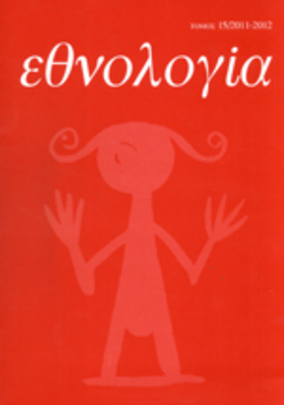Αυτοσχέδιο διαλογικό τραγούδι και γλεντικός συμβολισμός στην Όλυμπο Καρπάθου
Part of : Εθνολογία : περιοδική έκδοση της Ελληνικής Εταιρείας Εθνολογίας ; Vol.2, No.1, 1993, pages 155-200
Issue:
Pages:
155-200
Parallel Title:
Extempore dialogical song and the symbolism of Glendi
Author:
Abstract:
The search for the conceptual patterns and the symbolic practices of a society in different historical eras and the attempt to reconstruct them present especially complex analytical problems, constituting significant subjects for anthropological inquiry. In this article, I discuss the theoretical and methodological boundaries of a critical anthropological approach to social experience and symbolic expression -the questions of representation and interpretation- in relation to glendi, the main ceremony of the society of Olymbos, Karpathos (Greece) where I conducted field research in the period 1986-90. The glendi is a ritual involving four distinct yet interrelated communal activities -eating and drinking, playing of music, singing and dancing.According to written sources and the local oral tradition, glendi has been an actually performed communal ritual since at least the 1880s. Hence, I examine the symbolism of glendi as a diachronic cultural phenomenon. I explore its morphological and conceptual patterns in three historical instances of dialogical confrontation between Olymbians through extempore singing in different glendi situations. More specifically, I approach the glendi symbolism as a social practice with poetic and rhetorical components. I consider any procedure conducive to the making (and, of course, re-making) of glendi an aspect of the poetic component of its symbolism, whereas any intentional usage of the glendi idea and process I treat as rhetorical.To analyse these components I use two epistemologically different conceptual frameworks in a methodologically complementary way: the first belongs to the paradigm of the natural sciences, whereas the second to the interpretative paradigm. The first framework is founded on the kinematic model of circular motion through which the dynamic of movement is explained from the perspective of a participant as well as a nonparticipant observer, in terms of two opposite forces -the centrifugal and the centripetal. The second framework is constructed on the basis of the complementarity of perspective -the centrifugal and centripetal dimensions- as experienced and expressed through actual symbolic practice. To explore the reflexive and axiological aspects of the symbolism of glendi, I distinguish between the rhetorical usages of the poetic expressions of glendi as mythopoeic and critical, according to whether such expressions are constructed and perceived as orthodoxies or heterodoxies, respectively.The mythopoeic and critical analytical approach to glendi illuminates the rhetorical dialectics of its poetics. However, I do not examine the symbolism of glendi as an autonomous poetic phenomenon, but in relation to the political and economic conditions of sociocultural change in Olymbos: the confrontations be tween the landowners and the migrants, as well as those between the members of the Olymbian diaspora and the inhabitans of Olymbos.
Subject:
Subject (LC):
Keywords:
παραδοσιακά τραγούδια, αναψυχή
Notes:
*Σε πρώτη μορφή το άρθρο αυτό παρουσιάστηκε με τίτλο «Σκέψεις γύρω από τον καρπάθικο χορό» στο Συνέδριο «Μουσικές και Χοροί του Ανατολικού Αιγαίου» στη Σάμο, τον Ιούλιο 1993. Για την πολύπλευρη συμβολή τους στην επεξεργασία του παρόντος κειμένου, εκφράζονται ευχαριστίες ιδιαιτέρως στους Βασίλη Βασίλα, Κωστή Μηνά, Αντώνη Νταή, Γεώργιο Τσαμπανάκη και Γεώργιο Χαλκιά., Περιέχει βιβλιογραφία




